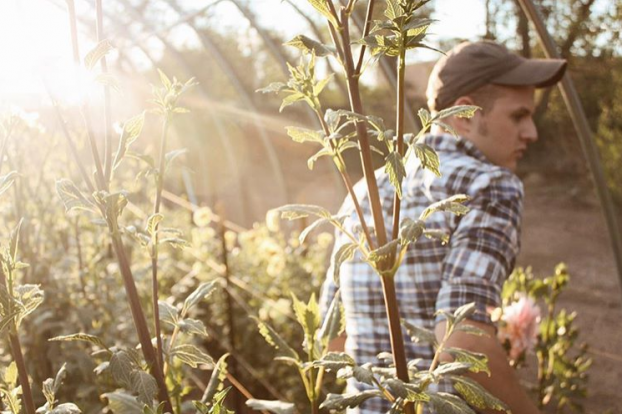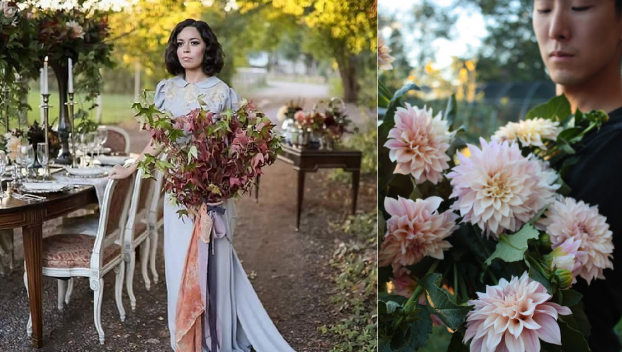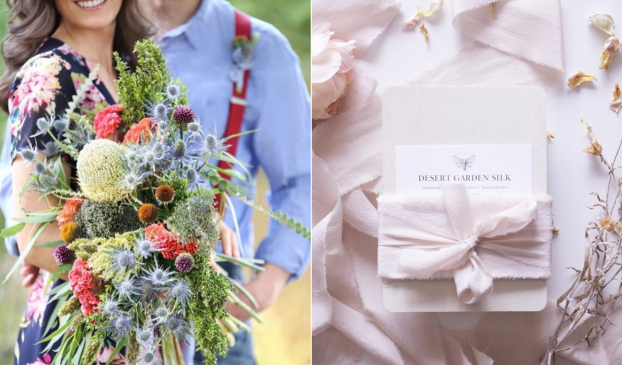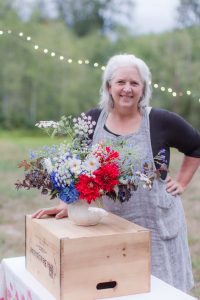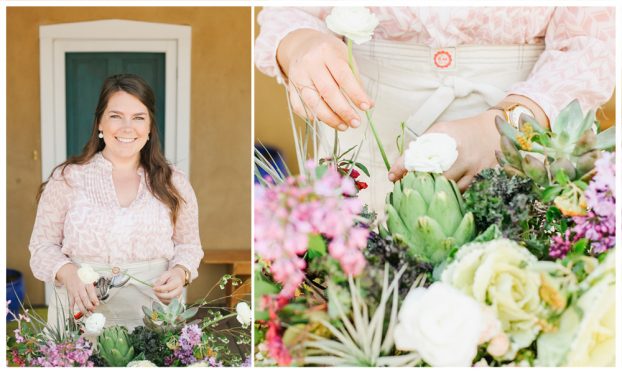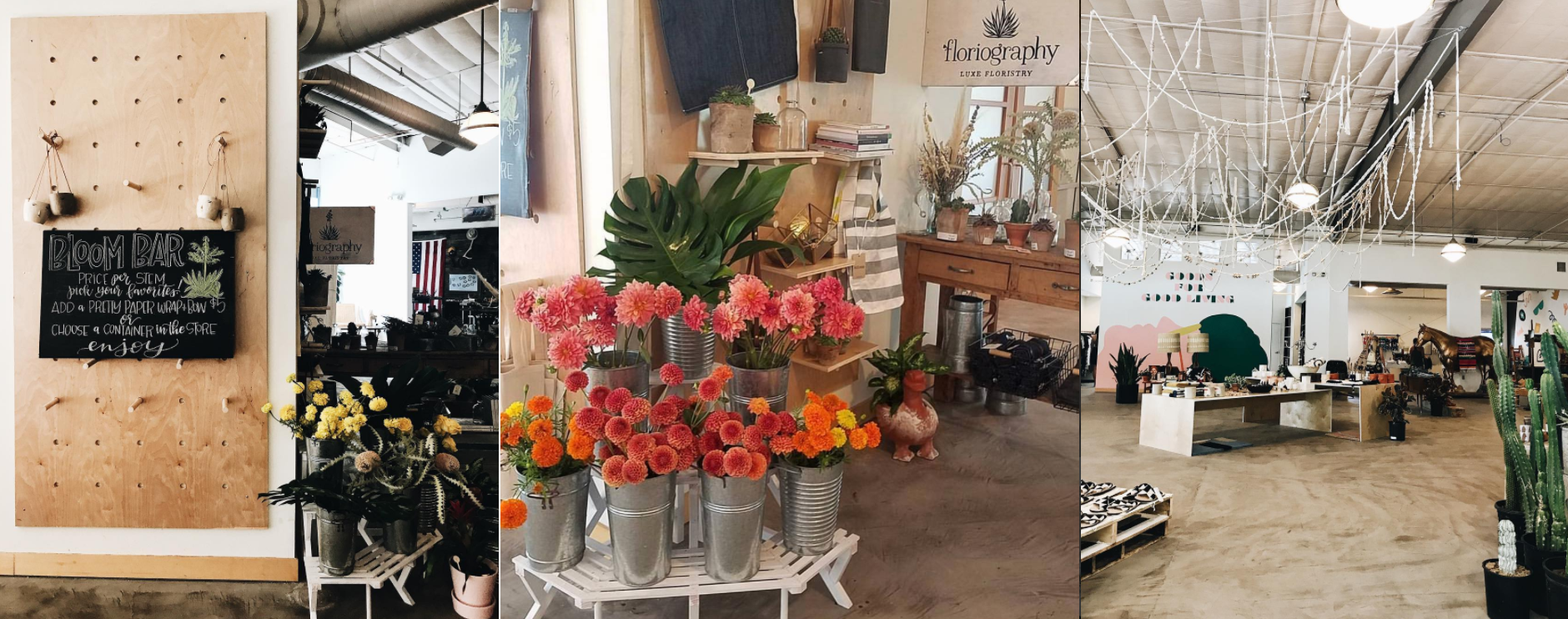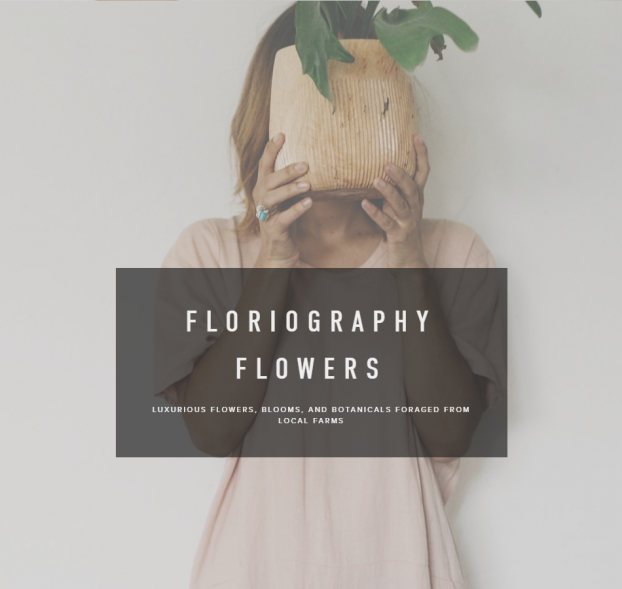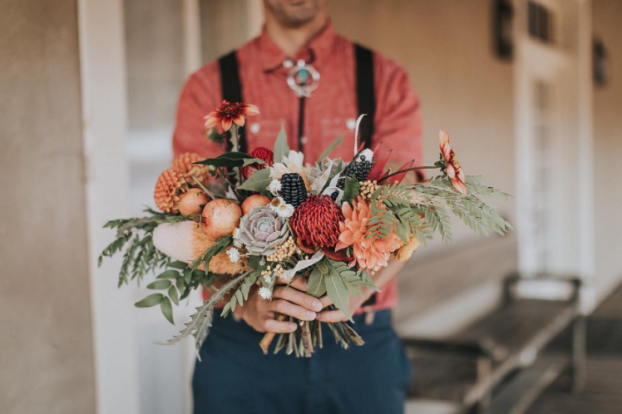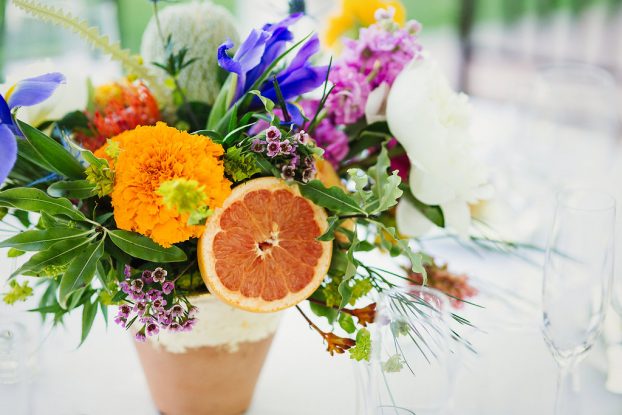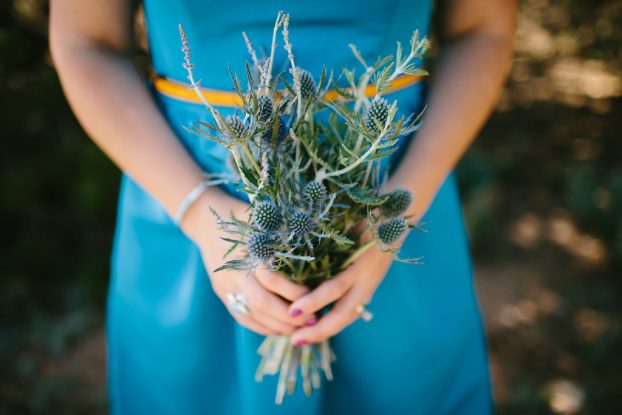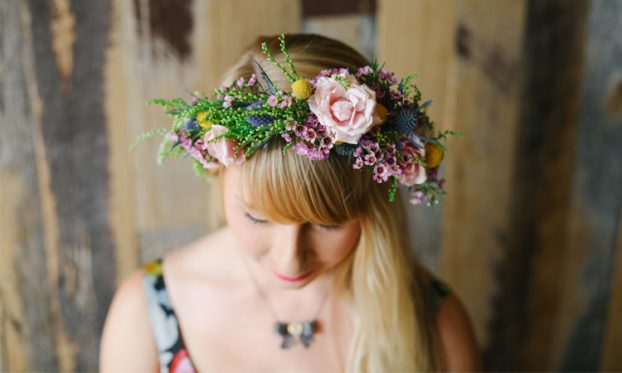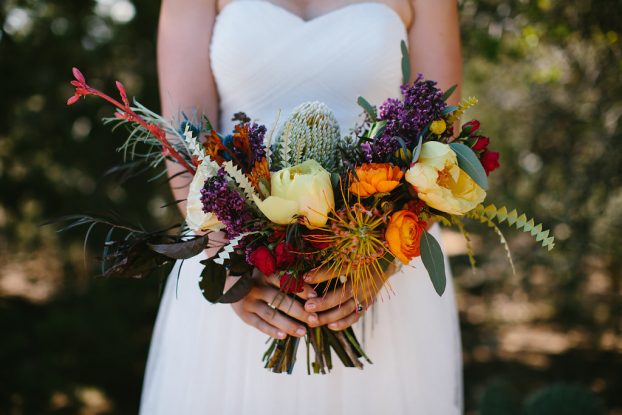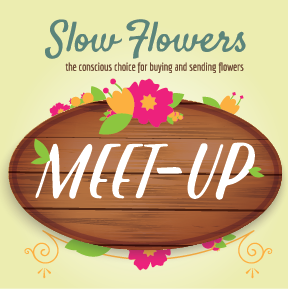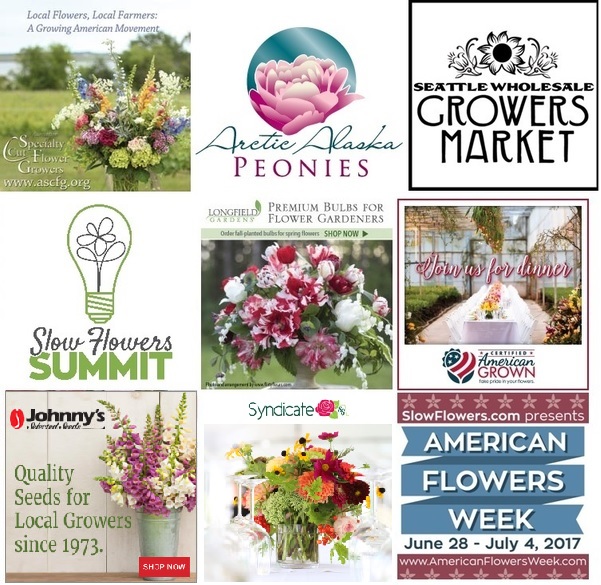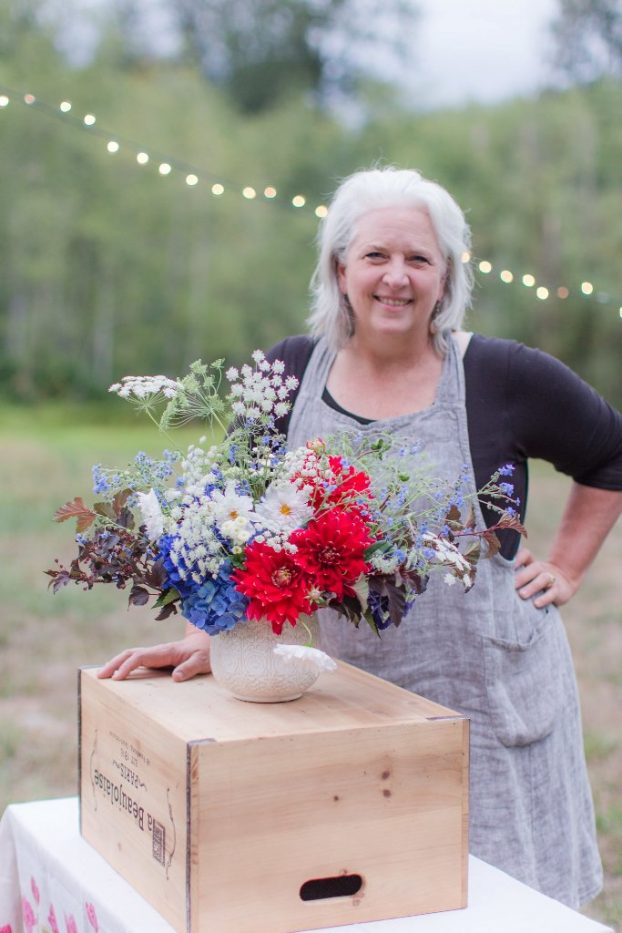Podcast: Play in new window | Download
Subscribe: Apple Podcasts | Podcast Index | RSS | More
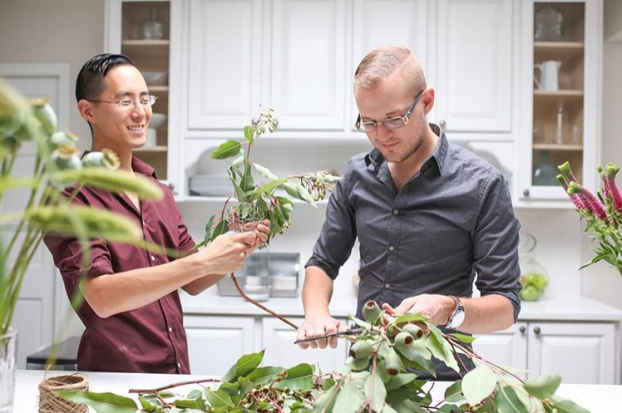
Kee-ju (left) and Steven (right) are the two partners behind the recently rebranded Table and Vase. (c) Jamie Jauriqui Photography
Steven and Kee-ju Hong Elder are an Albuquerque-based husband-husband duo that love gardening, growing and arranging flowers, eco-dying and more! We love all things beautiful and natural, and hope to help you cultivate a more beautiful life. They describe their business as “Not quite a farm, but not quite a garden.”
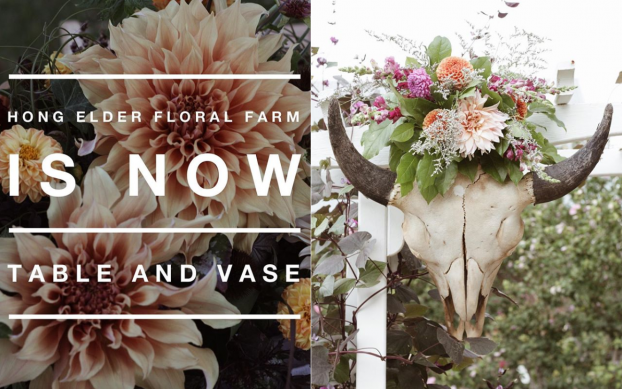 Steven and Kee-ju are experienced growers, cultivating boutique, heirloom and unusual floral material for Table and Vase. Originally calling their studio the Hong Elder Floral Workroom, the men recently rebranded. They grow flowers for their own design work as well as to provided select florists with boutique floral material.
Steven and Kee-ju are experienced growers, cultivating boutique, heirloom and unusual floral material for Table and Vase. Originally calling their studio the Hong Elder Floral Workroom, the men recently rebranded. They grow flowers for their own design work as well as to provided select florists with boutique floral material.
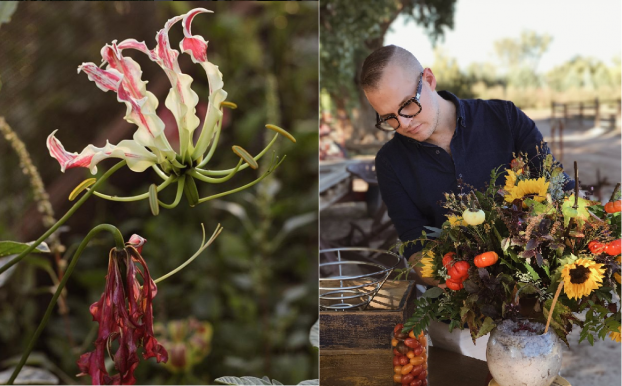
You’ll hear Steven discuss how growing gloriosa lilies is one of his passions in his Albuquerque “garden-farm”
They’ve been members of Slowflowers.com for more than a year and I have loved watching their Instagram feed filled with flower growing and floral design images. Visiting New Mexico again is on my list of destinations for 2018, mostly because my writing mentor Paula Panich now lives there, but also because of the burgeoning slow flower scene. You’ve heard from Emily Calhoun of Floriography Flowers, who’s shared her story in past episodes of this podcast – first about flower farming and most recently about opening a new retail venue in Santa Fe.
Emily Calhoun of Floriography Flowers on Episode 176
Emily Calhoun of Floriography Flowers on Episode 317
But now she has company, including a number of micro flower farms and farmer-florists who are helping boost interest and awareness in local and seasonal flowers. Together with Steven and Kee-ju, this community has also launched The New Mexico Flower Collective, a group of flower growers, farmer florists and other creatives who are passionate about locally grown, sustainably grown New Mexico flowers and supporting local businesses.
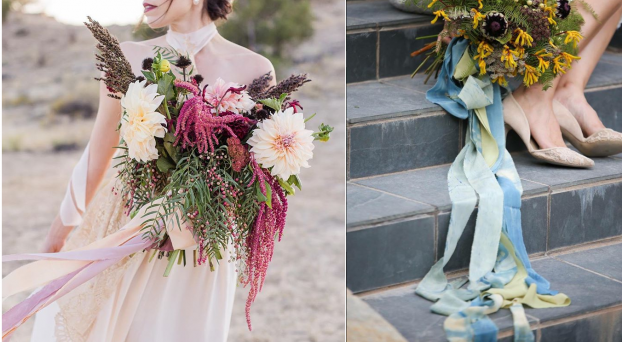
Floral design by Table and Vase with textiles by Desert Garden Silk. Photo credits: Maura Jane Photography (left image); Jamie Jauriqui Photography (right image)
Steven and Kee-ju also own Desert Garden Silk Ribbon, which they sell through an Etsy store featuring natural, plant-based, hand-dyed silk ribbons and textiles.
Here’s a little more about Steven and Kee-ju:
STEVEN, THE DESIGNER, has worked for years designing flowers for weddings and high end events. Inspired by color and seasonality from the garden, Steven combines his backgrounds as a horticulturist and floral designer to grow and create arrangements that are lush, full and grand.
He recently wrote that his first garden was an absolute mess, filled with zucchini, cucumbers, three types of pumpkins, scarlet runner beans, morning glory vines and a few sad tomato plants shoved into a raised bed in his parents’ front yard.
It was from that garden that Steven’s love of growing and plants first started. He went to school for horticulture, learning about xylem and phloem and tissue culture and greenhouse propagation. He learned how to identify trees, how to propagate tulips, and about breeding new species, loving every single moment of it.
After school, Steven accepted a position with the Lauritzen Botanical Gardens in Omaha, Nebraska. He was soon in charge of the Victorian garden, the peony collection, and an English perennial border. He also maintained the historical Crookhouse gardens and worked part time for floral designer, Kyle Robino, a friend and mentor.
Steven’s journey into floral design started as a creative outlet from gardening and horticulture, but soon grew into a way of life. He studied floral design in school, then worked for several years both with talented designers, and eventually striking out on his own as a freelance designer.
KEE-JU, THE FARMER, a hobbyist gardener, has a passion for growing plants that’s expanded into becoming a flower grower. Obsessed with nature since he was a little boy, his interest in nature and biology has evolved into his passion for gardening and growing. Kee-ju ensures that the flowers are grown with love and care.
He recently wrote about meeting Steven in Omaha when he was working at Lauritzen, saying “although a dentist by trade, in my off time I had been teaching myself how to grow flowers from what I had learned on the Internet – a lot of time spent on Dave’s Garden and poring over gardening blogs. When Steven and I met, our love of plants and gardening didn’t take long to surface. Although I tend more towards xeric and full sun and Steven tends more towards high moisture and shade, we got along well! We were married and moved to New Mexico within the year.
After our first year gardening in New Mexico, we had a discussion regarding flower farming. Both of us were avid followers of Erin Benzakein since her early days, and were enthralled with her fields of blooms as well as her very insightful tips for growing flowers. What would it be like to be growing not a dozen zinnias, but hundreds? Would we be able to handle thousands of seedlings as opposed to fifty? We decided definitively that yes, we wanted to do this and yes, we were more than capable of doing so.
Suddenly, our garden beds were not large enough for all the plants we wanted, so we prepared more. We found ourselves buying seeds and dahlia tubers and drip irrigation and digging and planting. It was terrifying and hard work, yet I had never felt more alive in my life.
I had found something that lit a fire within me staying up late reading information on how to grow and harvest sunflowers, scouring the Internet for tips on succession planting and harvesting, and dreaming of rows of flowers and big bouquets.
While I really enjoyed flower farming, I also realized that I did miss gardening without the intent to cut and harvest. Sometimes you just grow it because you want to grow it, not because it will be a good seller or hold up well in the vase. Steven and I made the conscious this year to return to gardening for ourselves.”
I know you’ll enjoy hearing from Steven — we’ll have to get Kee-ju’s voice in a future interview. Enjoy these photos and follow Table and Vase at these social places.
Thanks for joining me today! What a fun conversation — and I can’t wait to return to New Mexico to meet Steven and Kee-ju in person and soak in the beauty of flower farming in Albuquerque and beyond.
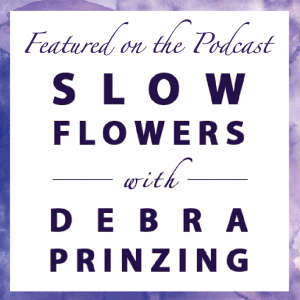 The Slow Flowers Podcast has been downloaded more than 282,000 times by listeners like you. Thank you for downloading, listening, commenting and sharing — it means so much. In fact, I want to report that the month of January ended with 11,222 downloads, our all-time high month of listenership. Isn’t that awesome!
The Slow Flowers Podcast has been downloaded more than 282,000 times by listeners like you. Thank you for downloading, listening, commenting and sharing — it means so much. In fact, I want to report that the month of January ended with 11,222 downloads, our all-time high month of listenership. Isn’t that awesome!
As the Slow Flowers Movement gains more supporters and more passionate participants who believe in the importance of the American cut flower industry, the momentum is contagious. I know you feel it, too. I value your support and invite you to show your thanks and with a donation to support my ongoing advocacy, education and outreach activities. You can find the donate button at debraprinzing.com in the right column.
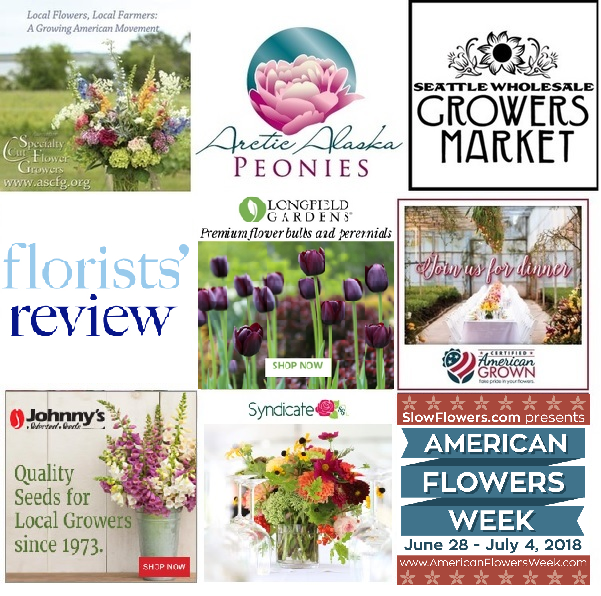 Thank you to our sponsors who have supported Slow Flowers and all of our programs including this podcast, American Flowers Week, the Slowflowers.com online directory to American grown flowers, as well as our new channels, Slow Flowers Journal and the 2018 Slow Flowers Summit.
Thank you to our sponsors who have supported Slow Flowers and all of our programs including this podcast, American Flowers Week, the Slowflowers.com online directory to American grown flowers, as well as our new channels, Slow Flowers Journal and the 2018 Slow Flowers Summit.
Florists’ Review magazine. I’m delighted to serve as Contributing Editor for the new monthly Slow Flowers Journal section, which you can find in the pages of Florists’ Review. It’s the leading trade magazine in the floral industry and the only independent periodical for the retail, wholesale and supplier market. Take advantage of the special subscription offer for members of the Slow Flowers Community.
Certified American Grown Flowers. The Certified American-Grown program and label provide a guarantee for designers and consumers on the source of their flowers. Take pride in your flowers and buy with confidence, ask for Certified American Grown Flowers. To learn more visit americangrownflowers.org.
Arctic Alaska Peonies, a cooperative of 50 family farms in the heart of Alaska providing high quality, American Grown peony flowers during the months of July and August. Visit them today at arcticalaskapeonies.com
Seattle Wholesale Growers Market, a farmer-owned cooperative committed to providing the very best the Pacific Northwest has to offer in cut flowers, foliage and plants. The Growers Market’s mission is to foster a vibrant marketplace that sustains local flower farms and provides top-quality products and service to the local floral industry. Find them at seattlewholesalegrowersmarket.com
Longfield Gardens provides home gardeners with high quality flower bulbs and perennials. Their online store offers plants for every region and every season, from tulips and daffodils to dahlias, caladiums and amaryllis. Visit them at longfield-gardens.com.
Syndicate Sales, an American manufacturer of vases and accessories for the professional florist. Look for the American Flag Icon to find Syndicate’s USA-made products and join the Syndicate Stars loyalty program at syndicatesales.com.
Johnny’s Selected Seeds, an employee-owned company that provides our industry the best flower, herb and vegetable seeds — supplied to farms large and small and even backyard cutting gardens like mine. Check them out at johnnysseeds.com.
Association of Specialty Cut Flower Growers. Formed in 1988, ASCFG was created to educate, unite, and support commercial cut flower growers. It mission is to help growers produce high-quality floral material, and to foster and promote the local availability of that product. Learn more at ascfg.org.
I’m Debra Prinzing, host and producer of the Slow Flowers Podcast. Next week, you’re invited to join me in putting more American grown flowers on the table, one vase at a time. And If you like what you hear, please consider logging onto Itunes and posting a listener review.
The content and opinions expressed here are either mine alone or those of my guests alone, independent of any podcast sponsor or other person, company or organization.
The Slow Flowers Podcast is engineered and edited by Andrew Brenlan. Learn more about his work at soundbodymovement.com.
Music Credits:









